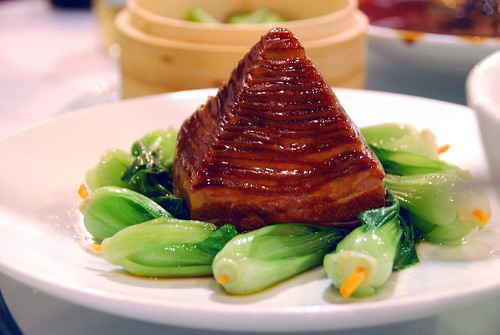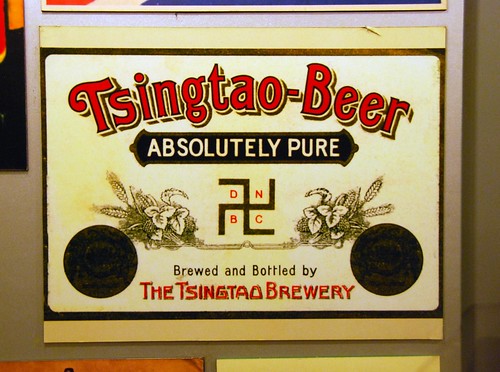Posts Tagged ‘Qingdao’
Oh, the highs and lows of traveling through China! There were definitely some lows (see Qingdao: Confronting Identity in a German Town in China and Yangshuo: Anatomy of a Scam), but the peaks and the valleys seem to flow into one another so that you’re no longer sure what hurts so bad and what hurts so good. Our Yangzi Three Gorges River Cruise is the perfect metaphor: we spent three days on a 4th class river boat with a bunch of half-naked Chinese people who only stopped smoking cigarettes, spitting, and playing mahjong long enough to follow a megaphone-wielding tour guide around in 100 degree heat. Yes, it was unpleasant at the time. But even now, almost 3 months after the fact, we bring it up in conversation almost every week and giggle at the absurdity of it all. It’s sort of like running a marathon: when you’re in the moment, you can feel blinded by the pain, but once it’s over, you’re really glad you did it.
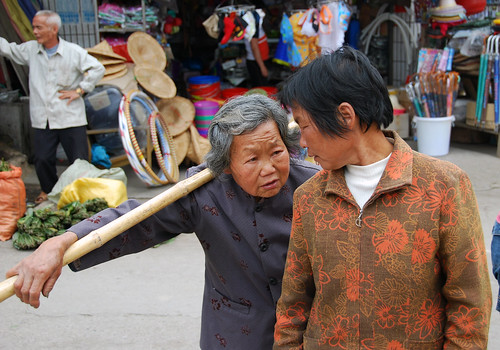
Ladies at the market near Hakka House.
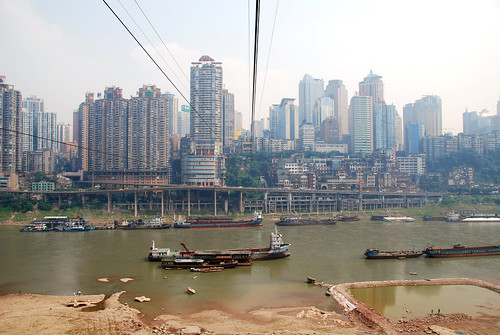
View of Jiefangbei from across the Jialing River in Chongqing.
As Jeremy put it, “of all the countries we’ve been so far, China is the one I would have most regretted missing.” China is relevant, y’all. It is freaking fascinating there right now, a place where nothing stays the same for more than a few weeks, the government is still messing with people’s civil liberties in exchange for making them rich, and people are spitting on the street in their US$500 Gucci heels. We think every Westerner should go. Observe. Learn. And see what a country of 1.3 billion people all working together to pull their country up by its bootstraps looks like. There’s no place like it.
Days spent here: 43 (26 days in Southern and Central China, 17 days in the North)
Highlights: Huangshan, Yangshuo (for Jeremy), Yangzi River Three Gorges Cruise (somewhat painful, but also unforgettable), Beijing
Places we would like to visit next time: Western China (i.e., Tibet, Xinjiang, Jiuzaigou) and Mongolia
Average daily expenditures (for two people): US$213 for 13 days on our 5 star hotel/fancy eating tour with my parents (heavily supplemented by Jack and Wendy—thanks Mom and Dad!), US$120 for the remaining 30 days on our usual 1 star hotel/street food backpackers tour
Prices: China’s pretty reasonable. Food is very inexpensive (from US$5-10 per person per meal) and accommodation can be pretty cheap too. On average, we paid about 200 RMB (approx. US$30) per night for a double room ensuite. We used hostelbookers.com and Ctrip.com to book our accommodation, and we got great deals using both websites.
Weather: Do yourself a favor and don’t visit northern China in June or July, unless you like your searing heat with a dash of crushing humidity. Don’t say we didn’t warn you.
Language: There are 300 million people in China learning English right now—that’s the same number of people that live in the US! But you wouldn’t know it from traveling in this country. If you don’t speak Mandarin, polish your pantomiming skills before you go. On the other hand, if you are a wai guo ren with Mandarin speaking skills, prepare to be worshipped. The people will fall all over themselves with delight.
If you do speak Chinese, be warned that you will need to overcome not only regional accents, but regional phrases as well (ex. if you are from Taiwan, you will call a spoon a tiao gen, but a Beijinger will refer to it as a shao zi). For instance, I had the following conversation with a person in Taishan (in Chinese, of course):
Hope: Excuse me, do you know if there is a pharmacy around here?
Random Person: A what?!? A pharmacy?
H: Yes, a pharmacy.
RP: I don’t know. Why don’t you go ask over there [points to a pharmacy], at the medicine store?
Oh yeah, and if you’ve ever been interested in visiting China, go now, before all the Chinglish gets wiped out.
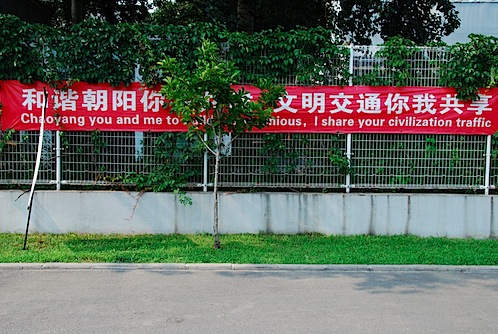
One day, China will be void of gems like this (reads: Chaoyang you and me to build harmonious, I share your civilization traffic)
Food: Outside of our eating tour with my parents and the food in Beijing, we weren’t too impressed with Chinese cuisine. We said it before and we’ll say it again: if you want the best Chinese food in the world, go to Taiwan.
That being said, China is a great place if your culinary hero is Anthony Bourdain. We got over ourselves really fast in Chongqing, where my aunt’s friends took us out to meals involving pig brains, duck tongues, cow rumen, and various other intestinal elements. You can also try snake, turtle, or live scorpions. Yum?
Transit: China’s got a pretty good rail system for such a big country. Chinese trains are not quite as nice as the trains in Taiwan or Japan, but they’re not as bad as the trains in Vietnam, either. For long journeys, you can purchase tickets for a soft sleeper (most expensive), hard sleeper, soft seat, or hard seat (cheapest). Soft sleeper trains are pretty nice, with 4 beds in each room, AC, clean sheets, and relatively clean bathrooms. “Hard sleeper” sounds scary, but it’s worth noting that hard sleeper beds aren’t hard—the mattress is just a little bit thinner. The biggest difference is that there are 6 beds in the hard sleeper rooms rather than 4. Since J and I are tall, we usually traveled in the soft sleeper trains, which are still relatively cheap, even though tickets are 1.5-2 times as much as the hard sleeper carriages.
For information on routes, schedules, and prices, check out ChinaTravelGuide.com’s fabulous online train schedule database.
The bigger cities like Shanghai and Beijing have subways, but Shanghai’s subway system has pretty bad signage and confusing connections. Beijing’s subway did not reach most of the sites in the city center, so we did a LOT of walking or took taxis. Luckily, taxis are very cheap in China’s capital city, but you’re going to have to speak Mandarin in order to get where you want to go.
Internet: Web access is great all over China—as long as the government isn’t blocking the site you want to surf. YouTube, Flickr, Facebook, Twitter, and all blogspot sites got blocked for periods of 3-10 days while we were in China due to the 20th anniversary of Tiananmen Square and the deadly Uighur protests in Xinjiang. Annoying.
Culture: Get ready for a culture shock. Get ready for people constantly cutting in front of you in line. Get ready for men walking around in inappropriate places with their shirts hiked up above their nipples. Get ready for spitting. Get ready for half-naked babies pooping in the street. Get ready for smoking. Get ready for LOUD. That being said, once you figure out how things work, it’s easy enough to deal with them.

Baby at the Summer Palace wearing the poop pants.
One fascinating thing about traveling through Taiwan and China is that we got a firsthand look at how differently these two countries developed culturally. The Taiwanese are exceedingly polite, aggressively helpful, and overly concerned about safety. The Chinese on the other hand, are rude and pushy, frequently uninterested in helping you, and some of the craziest drivers in the world. Now, you could point to many reasons for this cultural gap: the fact that it was the intellectuals and people of the upper classes that moved to Taiwan in 1949 to escape Communist persecution, the effect of 60 years of Communist rule on the people of China, etc. But I’d like to propose a different hypothesis: It’s the sheer numbers. There are 57 times as many people in China as Taiwan. You would get CRUSHED in China if you were nice and helpful to people all the time. The result is, if someone vouches for you in China (as my aunt did, in our case), you get extreme, excessive kindness from people that you may only marginally know you. But those same people on the street may wave you off if you ask for help. Yes, it’s a contradiction. But it’s a fact of life here. All I can say is, try to make friends with a local. If you do, you will get the red carpet rolled out for you.
In short: It’s not always pleasant, but that doesn’t mean it’s not a great time.
Since Tibet was out as our next destination, where to next? Mongolia? Train tickets were sold out for the entire week. Xinjiang? Tickets also sold out (and thank goodness we didn’t go because the deadly protests in Urumqi broke out a few days later). Here’s how we decided on our next stop: we consulted Weather Underground and looked for the coolest temps in Eastern China. Qingdao it is! Hey, we went to Malaysia for a good bowl of curry, why NOT choose a place based on the climate, especially after the heat in Beijing and Xian made us cry “uncle.”
Qingdao is a former German settlement in Eastern China known for its beach and its beer (which you may know by its Wade-Giles spelling, Tsingtao). It rained pretty heavily while we were there, but honestly, we didn’t care. As long as the the mercury didn’t climb above 90°, we were happy campers.

The Protestant Church in Qingdao.
Both German architecture and Chinese people on the beach are novel sights in China, which makes Qingdao a rare place indeed. But the brewery! Totally worth it, even though they were stingy with the free samples (a mere half pint!). The majority of the self-guided tour is pretty standard fare: the history of Tsingtao, different advertising campaigns, bla bla. What made the tour interesting is the actual, functioning bottling plant. I swear Jeremy and I stayed there for half an hour watching them bottle and can the Tsingtao brew. We’re nerds like that.
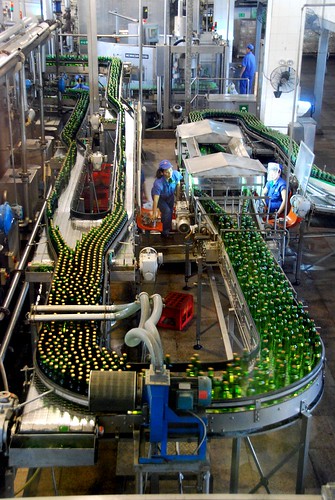
The Tsingtao bottling plant in action.
The other highlight of the Tsingtao brewery tour was the Drunk Room. Basically, it was a room where the floor was slanted. Simple but surprisingly effective! We totally felt drunk (it was BEFORE the tasting room, I swear)!

Me in the Drunk Room at the Tsingtao brewery.
I can’t say we loved our time in Qingdao…the city itself is really spread out, and beyond the brewery there isn’t much to do besides wander around the parks (which, I have to admit, are pretty nice), or try to find some German food to eat (surprisingly difficult in Qingdao! We only know of one place: Monnemer Eck, which is was dead empty when we dined there. Good food though!).
But there is one reason why this Chinese city will always stick out in my mind: I had a total meltdown trying to leave Qingdao. Are you ready for this?
We decided on our next destination (Taishan), and learned that there was both a bus and a train that could get us there. The express train left at 6AM, but only took 3 hours. The bus took 6 hours, left several times a day, and was cheaper than the train ticket. So J and I decided on the bus. Only thing is, NOBODY seemed to have any idea what time the bus left. There was no telephone number you could call, no schedule, and the bus station was about 15km north of the city center, so it wasn’t really convenient for us to hop over and ask. Whatever, we’ll just show up at the bus station the next morning, right?
So that’s exactly what we did. We got there around 9:30AM only to find that the next bus leaves at 12:30PM. Not wanting to wait 3 hours in the station, I call the train station and find out that there’s a non-express train leaving at 11AM. We hop in a taxi to the train station and wait in this line for tickets:
By the time I get to the front of the line, train tickets are sold out. Great! Back to the bus we go.
Over at the bus station, the saleslady tells me that tickets for the 12:30PM bus are sold out; next bus is at 3PM. Double great! We have little choice at this point but to wait 4 hours for the next bus. At least there were funny Chinglish signs there to keep us amused.

Is this where Chinese people go to stare at the tourists?
At around 2:30PM, I start gathering my things. But hold on a minute…something seems fishy. Why isn’t there a bus at our gate? I examine the ticket (which is all in Chinese), I see the numbers “12:30,” and I start to panic. Did our bus leave at 12:30? Why did the woman at the window tell me 3PM?!? It is possible I misunderstood, but the words for “3:00″ and “12:30″ sound REALLY different in Chinese. So i run up to the information desk, frantic.
Hope: Can you tell me if this ticket is for the 12:30 bus to Taishan? The woman at the window told me it was a 3PM bus!
Information Lady: We don’t have a bus at 3PM to Taishan. This bus left two hours ago.
H: But…but…the woman told me 3PM!
IL: Didn’t you hear them announce that your bus was leaving?
H: I wasn’t listening! I’m not from here!
IL: Well, there are no more buses, you have to leave in the morning.
H: [Almost in tears at this point, and not being coherent] I’m not from here!
IL: [Clearly disturbed by the weird Chinese American girl freaking out] It’s OK, I understand. Here, I can refund your ticket.*
*In retrospect, it was almost unbelievable that she so readily gave us a refund. But I was too distraught to recognize this at the time.
I can’t tell you why I wigged out so badly…the back-and-forth from the bus station to the train station and back again definitely kicked it off, but I think the bulk of it had to do with my growing suspicion that being a Chinese American traveling in China was not an asset, but in some ways a burden. Sure, there are times when it has been awfully convenient to be able to communicate. But there are other times I feel it is easier to have Jeremy’s face in China than my own. I couldn’t shake the feeling that this misunderstanding NEVER would have happened if Jeremy and I were two Western-looking people…they would have tried to find someone who spoke English, or they would have pointed out the time on the ticket.
And maybe that’s why I melted down—because the country to which I have attached my ethnic identity wants almost nothing to do with me. Nobody is trying to take their picture with me (whereas Jeremy’s face must be imprinted on hundreds of memory cards and hard drives around the country). Nobody wants to help me—in fact, sometimes they laugh in my face when I make a “weird” request (like, “can you put some vegetables in my soup?”—what a FREAK!) Or if I don’t understand the phrase they used, they talk about me like I’m not in the room, as if all of a sudden can’t understand anything they are saying. Heck, we even got scammed by my “people.” Do you think a Chinese person would laugh in Jeremy’s face if he mispronounced a word in Mandarin? Doubt it. They’d probably be too busy falling over themselves with adoration.

Jeremy posing with yet another unidentified Chinese boy at the Tsingtao brewery.
As a Chinese girl growing up in the USA, I spoke Mandarin at home, went to Chinese school on the weekends, and ate hot pot on Thanksgiving. I thought I was Chinese. Only now, after traveling through the countries of my ancestors, do I find that the truth is much more complicated than that. I find myself grossed out by all the spitting, annoyed with the crowds, irritated by the constant noise, disgusted by the bathrooms…and yet simultaneously, I want to defend this country to the Westerners who complain about the exact same things. I want to explain that Chinese people spit on the floor because they think blowing your nose in a tissue is disgusting. I want to challenge them to live in a country with 1.3 billion people and see what their public bathrooms look like. I want to tell them: just because it’s different doesn’t mean it’s bad.
Oh, the confidence that is inspired by that singular viewpoint!: To always look from west to east and not back in the other direction. Don’t get me wrong—there are many, many gifts that I was bestowed because of my ethnic heritage: a multilingual tongue, respect for my elders, a hair-free body. But that confidence is not one of them.
That day in Qingdao was the only time on the trip I just wanted to click the heels on my ruby slippers and go back home. You know, somewhere I felt like I belonged. Now if I only I knew where that could be…

